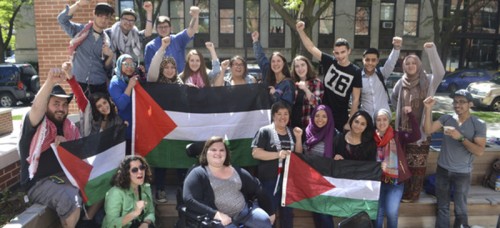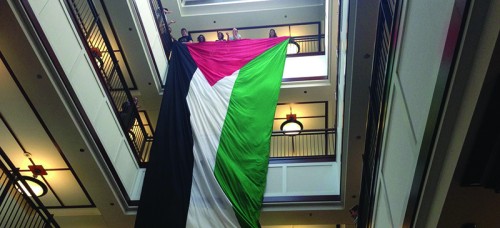
Last spring, DePaul students spoke out in support of Palestinian human rights, approving a referendum that called on the university to pull its investments from 12 corporations that perpetuated Israeli human rights violations.
While the success of the DePaul Divest campaign was a huge symbolic victory, our celebrations were short-lived. It is with heavy hearts that members of Students for Justice in Palestine (SJP) and the DePaul Divest coalition returned to campus this fall, with the horrific events that occurred in Gaza and the West Bank over the summer reminding us of the ongoing reality of Israel’s human rights abuses in Palestine, in which our tuition dollars are still invested.
It started with the brutal lynching of Palestinian teenager Muhammad Abu Khudair, forced to swallow gasoline and burned alive by Israeli settlers in occupied East Jerusalem. This act of collective punishment deeply troubled DePaul students, who organized a rally in response on July 5. His murderers lived in a settlement in occupied East Jerusalem, condemned in UN Resolution 66/18 as “illegal settlement activities” that have “a detrimental effect on the lives of Palestinians” and encourage “provocation and incitement” by Israeli settlers.
The collective punishment did not end there. On July 8, Israel launched Operation Protective Edge, a massive assault in which 2,300 Palestinians in Gaza were murdered by the so-called Israeli Defense Forces over a 50-day period. More than 80 percent of Gaza’s dead were civilians, more than 500 of those being children.
Israel’s policies of collective punishment are clear violations of international law. Members of the DePaul Divest coalition spent their summer organizing the nation’s largest Palestine solidarity rally, with over 10,000 protestors in attendance. At orientation, we were each told that the city of Chicago “is our classroom.” This was one of many instances where we made the city our classroom, one that reflected Vincentian values, leaving the imprint of DePaul’s stated mission on our city. We spoke truth to power, just as Saint Vincent would if he were alive today to witness Israel’s vicious attacks on Palestinian civilians in Gaza. We have internalized Saint Vincent’s mission in our organizing efforts and will continue to do so as we pursue full divestment from corporations complicit in these attacks.
Idle speech does not prevent these massacres. If our administration cares about Palestinian humanity and the humanity of its Palestinian students, it will live up to its Vincentian mission, begin the process of divestment and say proudly that we are divesting in affirmation of Palestinian human rights.
We are dehumanized daily when our tuition dollars are placed back into the same system that has ethnically cleansed our villages, massacred our families and continues to humiliate us, torture our loved ones, brutally beat us, lynch our youth, imprison our children and prevent us from returning to our homeland.
It is for all of these reasons that we launched the DePaul Divest campaign, and it was tremendously successful. According to a statement issued to us by the Fair Business Practices Committee (FBPC), following the success of the DePaul Divest referendum last spring, the DePaul Investment Committee of the Board of Trustees met over the summer and adopted the UN Principles for Responsible Investment initiative, or PRI, asking our fund managers to sign on to these principles to ensure socially responsible investment in the future.
This winter, when DePaul Divest once again publicly called for the establishment of investment screens to ensure ethical investment practices, an article was published in DePaul Newsline entitled, “Socially Responsible Investments Continue to Increase at DePaul.” The timing of both of these events is no coincidence. It is also no coincidence that 10 percent of our money managers have signed on to the PRI since the success of the DePaul Divest campaign.

It is due to our organizing efforts that DePaul attempted to take a step in the right direction. However, our work does not end here. In fact, it is just beginning. Concrete and deliberate divestment from the 12 multinational corporations we have outlined is still our demand, and it is a process that our university must begin immediately. The PRI falls short of meeting this demand, and in fact, does not adequately address human rights issues in its scope.
Furthermore, the PRI does not advocate for divestment as the DePaul Divest campaign does, but encourages shareholders to use their leverage to influence the companies that they are invested in. However, one cannot claim in good faith that this strategy seeks to honor the Palestinian call for divestment from corporations that fuel their oppression. Initiatives that rely on a vague conception of “responsible investment” without concrete demands serve only to mitigate our ongoing complicity in violence and occupation rhetorically, without doing anything to change it. We cannot accept this. It is our responsibility to hold ourselves and our university to a higher standard; one that reflects our Vincentian mission.
The global campaign for Boycott, Divestment and Sanctions (BDS) for Palestinian human rights can achieve this, and it gains momentum daily. It is an ethical, rights-based movement modeled after the South African Anti-Apartheid Movement, asking the world to hold Israel accountable to international law and conventions.
Campaigns to divest from Israel’s human rights abuses began in 2009 with Hampshire College. Soon after, divestment spread throughout the University of California (UC) system. A majority of UC schools have passed divestment. The University of California Student Association (UCSA), a body that represents all student governments of the UC system, also voted in favor of divestment earlier this month. Students in the University of California system led the charge in advocating for university divestment from apartheid in South Africa. Just last week, our neighbors at Northwestern University passed a successful divestment resolution through their student government. The night before, divestment was passed at Stanford University. Will DePaul join the growing chorus for social change? The tide is changing quickly and DePaul students are showing you the way; we must divest now.
It is time for us to remove our complicity as an institution. In April 2014, SJP member Leila Abdelrazaq said in a DePaulia article that our administration has a history of boycotting companies that engage in unethical behavior, but yet fails to publically acknowledge doing so. When our administration made the ethical choice to divest from apartheid in South Africa, it never publicly acknowledged the act as a response to the South African call to divest from the corporations that perpetuated their oppression. This silence is morally questionable and certainly cannot be reconciled with our Vincentian mission.
Let us not repeat our past mistakes. When our university divests from Israeli human rights abuses, we must affirm the humanity of Palestinians and Palestinian students at DePaul, and say proudly, “Palestinians are humans. Palestinians deserve to live as we do and for this, we divest.”